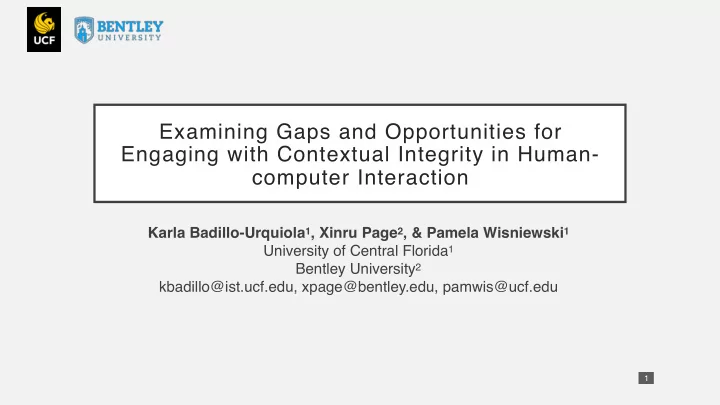

Examining Gaps and Opportunities for Engaging with Contextual Integrity in Human- computer Interaction Karla Badillo-Urquiola 1 , Xinru Page 2 , & Pamela Wisniewski 1 University of Central Florida 1 Bentley University 2 kbadillo@ist.ucf.edu, xpage@bentley.edu, pamwis@ucf.edu � 1
PRIVACY THEORIES • Classifying Information Type by Sensitivity • Awareness and Control of Information • State-based Perspective � 2
PRIVACY THEORIES • Classifying Information Type by Sensitivity • Awareness and Control of Information • State-based Perspective Privacy Paradox � 3
PRIVACY THEORIES • Classifying Information Type by Sensitivity • Awareness and Control of Information • State-based Perspective Privacy Paradox • Norm-based Perspective � 4
RESEARCH QUESTIONS • RQ1 : Within which technology contexts do HCI researchers apply CI? • RQ2: How deeply do HCI researchers engage with CI? • RQ3: What types of studies do HCI researchers conduct when applying CI? � 5
METHOD: SEARCH CRITERIA 1. published within the last 10 years (2008-2017) 2. must be peer-reviewed, and 3. published in the top HCI journal or conference venues based on Google Scholar and Microsoft Academic Research rankings • union of rankings = 32 top HCI venues � 6
METHOD: SEARCH AND ANALYSIS KEYWORD SEARCH CODING DIMENSIONS • case-insensitive phrase “contextual • Technology context : the type of technology being studied, integrity” in each of the 32 venues. • CI engagement : to what extent CI was • A total of 24 papers were found. used in the research, • Type of HCI research conducted : • 8 articles did not meet our search criteria whether the study was a formative or summative evaluation and the type of • 1 duplicate article removed scholarly contribution made by the research • Final total = 15 articles (e.g., design implications, framework, new technology). � 7
� 8
TECHNOLOGY CONTEXT IN WHICH CI IS USED • IoT (7/15) e.g., • Luger – new forms of consent • Jennings et al. – Human-Agent Collectives • Social Media (5/15) e.g., • Wang et al. – Facebook default privacy settings • Ayalon and Toch – temporal aspects of Facebook posts • Shi et al. – interpersonal privacy concerns on Facebook • Mobile Devices (3/15) e.g., • Shilton – data collection on mobile phones • Shklovski – potential privacy breaches • Moorthy and Vu – use smartphone voice activated personal assistants in public � 9 spaces
LEVEL OF ENGAGEMENT WITH CI • Referenced CI primarily in background literature (9/15) • 2/9 – Citations Only • 7/9 – Explained the Framework • Guiding framework for understanding privacy challenges (2/15) • Informed study design and data analysis (4/15) • 2/4 – Informed codebook • 2/4 – Integrated into study design � 10
THE TYPES OF HCI RESEARCH THAT APPLY CI (8/15) • Performed a user study (8/15) • 7 Formative evaluations • 1 Summative evaluation • Design implications and avenues for future research (7/15) � 11
PRELIMINARY RECOMMENDATIONS • Future studies could benefit from operationalizing the framework of CI as a robust multi-dimensional construct. • Future studies focus on summative evaluations of systems that instantiate CI in a meaningful way • Open-ended question • Systematic Scoping of the Literature (Forward reference search of Nissenbaum’s Foundational Works = 79 additional articles) • Lens for qualitative coding (domain, depth and nature of engagement) • Distinguishing between CS and HCI � 12
Privacy in Context: Critically Engaging with Theory to Guide Privacy Research and Design Workshop @ CSCW (Jersey City, NJ) on Saturday Nov 3 • Apply by September 24 (2-4 pg. position paper) • https://networkedprivacycscw2018.wordpress.com/ • Keynote: Helen Nissenbaum • Organizers : Karla Badillo-Urquiola (UCF), Yaxing Yao (Syracuse U.), Oshrat Ayalon (Tel-Aviv U.), Bart Knijnenburg (Clemson U.), Xinru Page (Bentley U.), Eran Toch (Tel-Aviv U.), Yang Wang (Syracuse U.), Pamela Wisniewski (UCF) • Program Committee: Louise Barkhuus, (U. of Copenhagen), Marshini Chetty (Princeton U.), Shion Guha (Marquette U.), Roberto Hoyle (Oberlin College), Jen King (Stanford Law), Lorraine Kisselburgh (Purdue U.), Priya Kumar (U. of Maryland), Airi Lampinen (Stockholm U.), Yifang Li (Clemson U.), Heather Lipford (UNC Charlotte), Florian Schaub (U. of Michigan), Irina Shklovski (U. of Copenhagen), Luke Stark (Microsoft Research Montreal), Janice Tsai (Mozilla), Jessica Vitak (U. of Maryland), Michael Zimmer (U. of Wisconsin-Milwaukee) � 13
QUESTIONS? • Thank you! • Karla Badillo-Urquiola , kcurquiola10@knights.ucf.edu • Xinru Page , xpage@bentley.edu • Pamela Wisniewski , pamwis@ucf.edu � 14
Recommend
More recommend